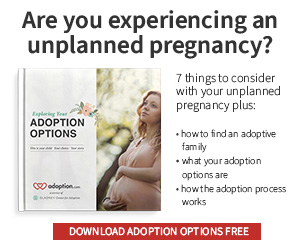Placing a child for adoption is one of the biggest decisions one can make. It demands a selfless character, one that requires a complete love for the child. However, it will probably be met with emotions of self-regret and insecurity.
Plenty of research goes into the many areas of social work. One area that has been minimally researched, though, is that of birth mothers and their level of satisfaction and acceptance in their decision to place their child as time moves on. Butler University and their University of Social Work recently released a study which explored how time affects a birthmother’s feelings and/or dissatisfaction about placing their child for adoption.
Their research resulted in several findings. One is that “satisfaction is not static.” Although satisfaction was reported to improve over time, more cases report that it usually lessens as time moves on. Age was also measured as a factor of birth mother satisfaction, it was discovered that “age has an inverse relationship with satisfaction.” The findings reported that as the age of the birth mothers increased, so did the level of satisfaction. Additionally, “higher education and higher income led to decreased satisfaction.” It stated that some birth mothers felt with more education and financial resources they could have parented their child. Alternatively, “birth mothers who work full-time were more likely to express increased satisfaction.” The research stated that birth mothers feel working full-time would have given them less time at home to fully care for their child.
Research also revealed that “birth mothers who have current contact with their child were more like to express satisfaction with their decision.” It helps birth mothers to have closure; they can see the child is doing well and thriving.
The researchers hope that these results will aid in the adoption process by showing where positive steps need to be implemented. They stated that they hoped to see many changes, including “annual grief training for adoption professionals, policies ensuring birth mothers have access to ongoing support services, free grief support groups for birth mothers, hope that everyone in the adoption triad receives information about the benefits of ongoing post-adoption contact, and stipends for expectant mothers to hire legal counsel to represent the mothers at the relinquishment and during sensitive discussion regarding post-adoption contact.”
Overall, this research shows the importance of communal support in the adoption triad. It expresses the importance of the birth mother, the positive role they can play, and how having that role can have a positive impact on everyone as time progresses.



